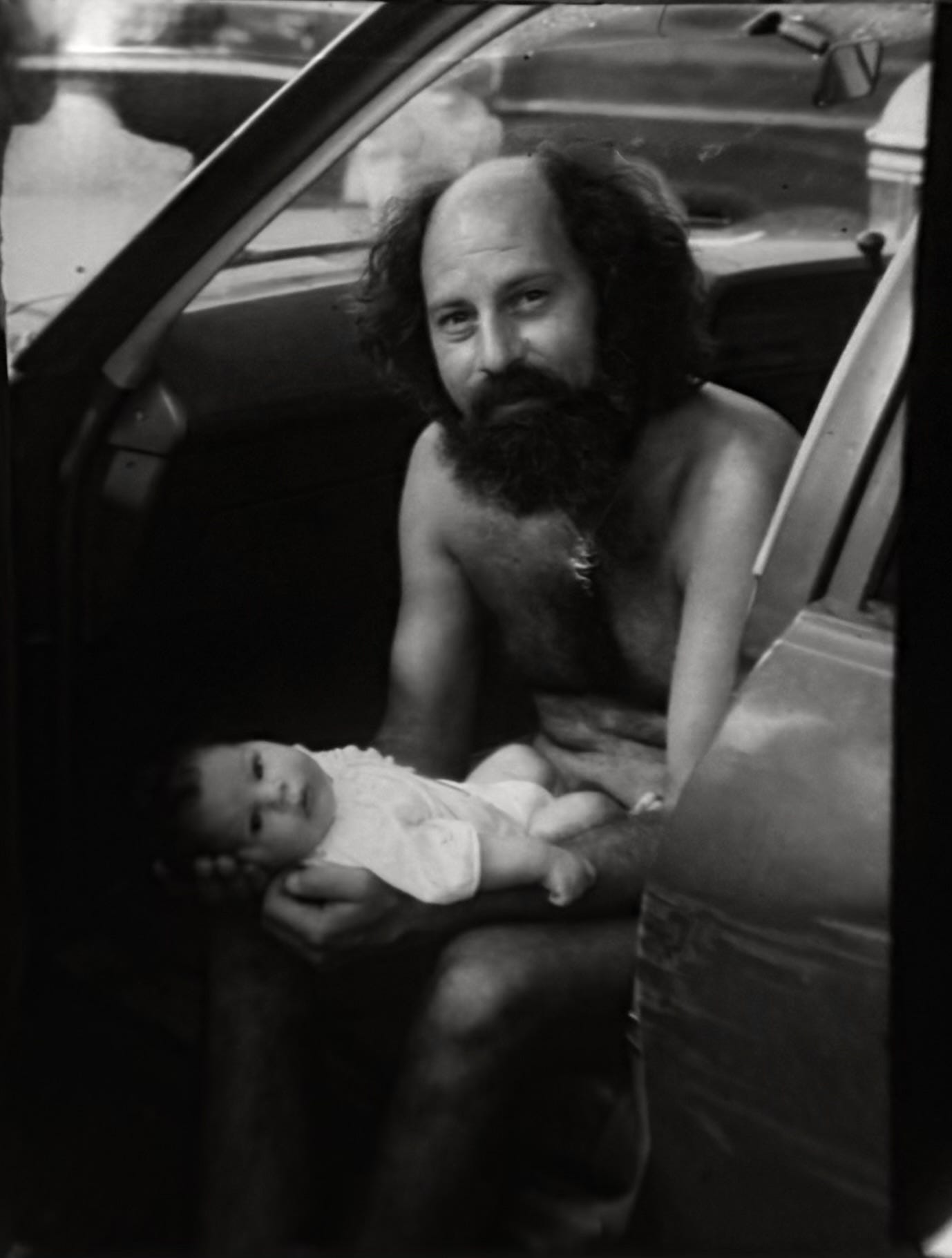for those whose becoming occurred without a masculine witness
There exists a particular exile for women whose coming-into-being was not mirrored by the masculine, whether through father absence or through the slow erosion of the masculine on a civilizational level. This absence is not merely emotional, but a rupture in the structure of reality as experienced by the feminine—a world where form exists without containment and longing awakens without an answering presence. It is not merely a social condition, nor reducible to therapeutic shorthand. It is the metaphysical anomaly of a psychic architecture left partially unbuilt. The daughter becomes a woman without ever having been seen by the Father—not just the man, but the archetype. The ricochet of an absent parent belies the reality of an absent principle.
And so, she constructs herself.
The mythic inheritance of such women is not weakness but rather a staggering sovereignty achieved in a vacuum. Without the stabilizing gaze of the masculine to witness or contain her flowering, the feminine turns inward and becomes her own spine. She is given the grueling task of developing her own inner animus by necessity—cultivating within herself the very masculine principle that was never offered externally—without the blueprint of a father to project it onto. This Promethean act of mythic reconstitution is invisible alchemical work that goes completely unnoticed by culture at large.
While heroic, yes, to create and inhabit this archetypal masculine for herself, it is also consumingly exhausting. Jung observed that the animus in a woman, when unintegrated, behaves as a tyrant, a phantom, or a seducer. But when refined, he becomes Logos—the principle of order, discernment, and protection. In a culture where masculinity is caricatured as either dominance or obsolescence, there is no coherent place for this principle to land. The inner masculine becomes overfunctioning, compulsively capable, and endlessly vigilant. The woman who raises herself becomes a fortress—admirable, impenetrable, and quietly collapsing beneath the weight of her own scaffolding.
Then comes the paradox.
Having mastered self-containment, the feminine no longer wishes to hold it all. She does not long to collapse—but to rest. Her ache is not for a partner, per se, but for the presence of the sacred masculine. The one who does not devour her but sees her. Who penetrates not to conquer, but to hold. Does not rescue, but receives her. She desires not a “boyfriend” or a “husband”, but a temple in which her amplitude is neither feared nor fetishized. A structure spacious enough to hold the vastness she has become.
But no mortal man can complete an archetypal absence. He cannot play stand-in for the divine. The psyche reaches for the infinite and grabs hold of the finite, then wonders why it feels like starvation.
What is required, then, is not simply a healing of the “father wound,” but a profound shift in ontological allegiance. A reorientation from personal history to mythic structure. She must recognize that the wound is not individual—it is civilizational. We live in a world saturated with the masculine form, but starved of the masculine function. A crisis not of manhood, but of masculinity itself.
The instincts of modern men have been hijacked by dopamine loops, endless novelty, unresolved mother wounds, ego survivalism, and centuries of collective trauma and entitlement. The patriarchal structure—contrary to popular framing—was never built for women. Its first victim was the masculine itself. It enslaved men to empire and turned women into spoils. What we now call “toxic masculinity” is not the essence of the masculine, but its disfigurement. Men, now abandoned by ritual and adrift in capitalism, perform masculinity without source code. Their pursuit is algorithmic, not ecstatic.
Masculinity—the impulse to “hunt and pursue”—is not inherently toxic. It’s neutral. But when stripped of ritual and undirected by spirit, it degrades into compulsion. Modern man does not pursue to revere, but to conquer. They scatter seed not for familial abundance, but from a desperate need to confirm themselves through consumption.
Without incredible discernment to separate the archetype of the masculine from the objective reality of modern man, the unfathered feminine often falls prey to a toxic fixation on unavailable, distant, or inattentive men. When her longing fuses with unmet childhood need, it becomes obsession, projection, and a fixation on figures who are not initiators, but placeholders. This is not foolishness or naiveté but sacred misplacement. It is the psyche’s symbolic attempt to resolve a metaphysical deficit through an objective reflection. She is not attached to the man—she is ensnared in the unfinished myth. The psyche keeps reaching toward that familiar shape, not because it’s healthy, but because it’s unfinished. And the fixation is the inner child’s attempt to resolve what is unresolved—to finally be held, seen, and contained. The repetition is ritual. A misdirected initiation. A grasping toward closure in the shape of eros.
What appears as romantic obsession is often a grief without language. It is a longing for the return of the mirror that never was.
And yet—he cannot return.
The myth must be completed from within Her.
It is impossible to reconcile an archetypal absence with a personal substitute. The sacred masculine must be resurrected in principle before the mirror of existence responds in kind. To conflate male attention with masculine containment is to drink salt water and call it a baptism. Until he is alive within her, no man can carry the weight of what was withheld.
The Inner Resurrection of the Masculine Principle
The reanimation of the inner masculine begins not with discipline, but with sanctity. She reclaims the function of Logos—the principle in her that names truth without fear, holds boundaries like architecture, protects the generative, and organizes the formless into form—not as a performance of invulnerability, but as holy infrastructure. She does not become masculine. She becomes whole.
Only then does the external discernment sharpen: she no longer projects godhood onto manhood. She sees clearly. The man who disappears is not mysterious. The one who withholds is not deep. The one who performs interest but cannot stay is not tormented—he is uninitiated. And she is no longer available to substitute herself as the temple in which he might grow because she now knows that her place as the mythic feminine is not in teaching grown men how to be men.
And when, or if, a man appears who is equal to the vibration of her earned integration, she will not surrender herself, but expand within the structure of his presence. Not because he completes her, but because he does not require her diminishment.
Until then, the ache is permitted to remain as she stops pretending it’s just a “dating pattern” and starts seeing it as an initiation rite for the priestess becoming whole. She stops reconciling toxic behavior with sacred archetype and starts becoming the priestess of her own standards. Do not dim your discernment. Do not shame your longing. Even the self-realized woman can ache for a gaze that doesn’t distort her.
You don’t need every man to rise to meet you. You only require one. And he doesn’t need to be perfect. He simply needs to be awake enough to recognize what you carry. Until then, let your own inner masculine keep vigil at the gate. Let him say, “Not yet.” Let him speak truth to the yearning part of you.
You are not unworthy. You are simply unmatched.
For now.






This tied every loose end and made sense of everything that was left over still scattered on the floor of my life. I don't think I've ever experienced reading as perfect a description of the trajectory of my life's inner world with such a depth of understanding as this piece of writing. Speaking for myself, as a woman and mother with that "absent mirror", it can be painful to visit the memories of that longing and desperate anguish, and to accept that I had to set down the struggle of the delusion I was sold, and to give up that fantasy, but just ahead is wholeness and true healing. I'm walking into it and what a beautiful feeling that is. Thank you so much for blessing us with the fruits of your heart and mind.
Jaz, this is a topic that is tender to my heart and soul. I have been surrounded by men, both weak and powerful, abusive and kind, generous and stingy and have not met one on either spectrum that could align with my energy. Having had to become hyper masculine myself, to manage the abusers and predators I now see the answer to the paradox of being a woman in such a stage of civilization. This is such an enlightening read and perspective. Thank you for expanding so deeply 🙏🏼